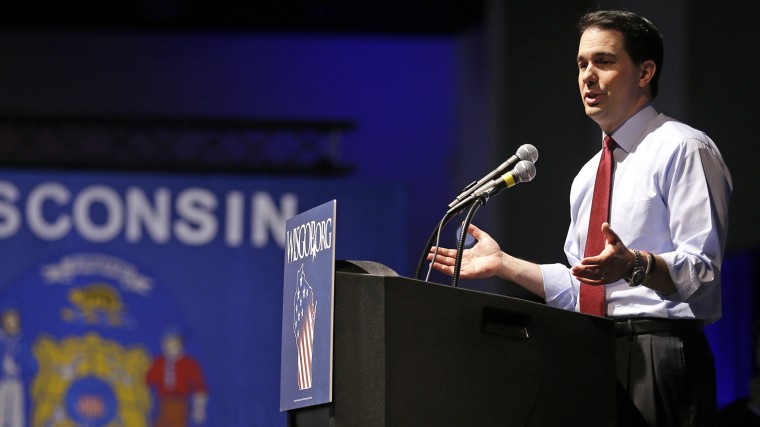Wisconsin's voter-ID law is such a fiasco, it's hard not to wonder sometimes how anyone could defend it. In a debate on Friday night, Gov. Scott Walker (R), who fought to impose voting restrictions before his re-election bid, made his best case.
Walker said that the voter ID law, which the U.S. Supreme Court just blocked from being enforced, is worthwhile if it stops one person from fraudulently casting a ballot. "It doesn't matter if there's one, 100 or 1,000," Walker said. "Amongst us who would be that one person who would like to have our vote canceled out by a vote that was cast illegally?"
This isn't a good argument, but it's important to evaluate in the context of the Republican "war on voting" in general.
Walker realizes that there are no documented incidents in modern Wisconsin history of a voter committing voter fraud, at least not in a way that could be prevented by a voter-ID law. The Republican governor also realizes that independent estimates suggest more than 300,000 legal, eligible Wisconsin voters could be disenfranchised by this voter-ID law, which addresses a problem that doesn't exist.
But note the calculus Walker makes: disenfranchising 300,000 legal voters is a price he's willing to pay to ensure that one -- not one percent, just one literal individual -- fraudulent-but-hypothetical vote isn't cast. Wisconsin's governor is prepared to create the worst election-related chaos in the nation, on purpose, regardless of the costs or consequences, if it means one individual who might cast a fraudulent vote is prevented from doing so.
If this is the best argument Walker can come up with, voter-suppression proponents really need to come up with new talking points.
Of course, I should mention that the governor's defense is, at least for now, a moot point. The U.S. Supreme Court blocked implementation of Wisconsin's ridiculous law last week.
That said, Walker's administration, and Wisconsin's Republican state attorney general, are still looking for ways to impose this and related voting restrictions in this year's election.
This is no small matter for the governor's personal prospects -- polls show him in a very tight race against challenger Mary Burke (D), and if Walker can disenfranchise 300,000 voters, his odds of winning improve. In other words, the Republican incumbent has a strong incentive to prevent many of his constituents from voting, and he continues to look for new ways to make that happen.
